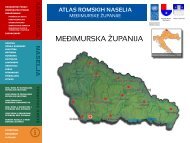You also want an ePaper? Increase the reach of your titles
YUMPU automatically turns print PDFs into web optimized ePapers that Google loves.
Conference declaration<br />
180 participants from 21 countries of the ‘4th International conference on the organic<br />
sector development in Central/Eastern European and Central Asian countries’<br />
that took place on April 13-14, 2012 in Izmir, Turkey, passed this declaration.<br />
Countries of the region have either implemented or<br />
are currently working on introducing organic regulations.<br />
Still some countries have not taken any actions on developing<br />
their organic sector.<br />
Thus the needs of organic stakeholders are differing.<br />
Regulations as well as private standards have provisions<br />
for the inspection, certification and accreditation of all<br />
entities involved in the supply chain. The guarantee provided<br />
by these systems is based on nearly identical criteria. The<br />
conference participants agree that the organic verification<br />
system provides the highest integrity compared to non-organic<br />
food systems. However, there is still room for improvement<br />
in closing gaps, strengthening weak aspects and nonconformities,<br />
and preventing loss of consumer trust.<br />
The participants of the conference state that:<br />
National or regional standards or regulations in line<br />
with international organic guarantee systems shall be adopted.<br />
Existing organic laws shall be enforced and the term<br />
“organic” protected against any misuse.<br />
Cooperation (local, regional, international) among<br />
all actors (CBs, consultants, research, governmental and<br />
NGOs, training institution, the trade at all levels and others)<br />
shall be enhanced, thus employing all appropriate tools for<br />
achieving integrity, including social control.<br />
Consultancy on all levels of the supply chain should<br />
get more attention as a tool for improving knowledge and expertise<br />
of the organic system as well as solving critical issues.<br />
Enhanced investment in capacity building is needed<br />
at all levels for improving knowledge and expertise of the organic<br />
system: in good agriculture practices for farmers, up to<br />
date technologies for processors, analytical procedures and<br />
result interpretation for CBs, and quality management for all<br />
stakeholders along the supply chain.<br />
Transparency between all actors in the organic value<br />
chain must be enhanced and verified by CBs where possible.<br />
Real-time public databases should be established<br />
showing current certification status of operators. Where possible,<br />
these databases should have interfaces with one another<br />
to allow for data exchange and cooperation.<br />
Manufacturers and especially (brand) companies are<br />
encouraged to take on the responsibility for sourcing of each<br />
of their products, thus closing gaps and reducing the risk of<br />
fraudulent products entering the supply chain.<br />
Perpetrators, and would be perpetrators, of fraud<br />
must be shown that the organic market is no place for them<br />
and they will not be tolerated. Training specific to possible<br />
fraud indicators should be deployed throughout the organic<br />
value chain. CBs and inspectors must be better trained in<br />
fraud investigation techniques. Eventually, forensic fraud investigation<br />
shall be undertaken by other entities.<br />
Source<br />
ISSUE II 11






